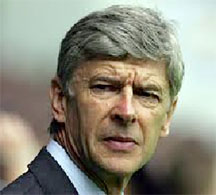LONDON, (Reuters) – Arsene Wenger has been called many things since he walked into Arsenal’s old marble-halled Highbury stadium in 1996 to launch one of the most successful eras in the club’s history.

Single-minded, innovative, principled, inspirational, a tactical wizard with an unshakeable belief in the game’s fine arts, his most staunch allies would say.
Others argue the professorial Frenchman is too stubborn for his own good, often ungracious in defeat and, in the harsh words of Chelsea manager Jose Mourinho “a specialist in failure” during nine lean years since the club’s last trophy.
Whatever description best fits the mercurial 64-year-old Frenchman, his durability remains beyond question as he prepares to select an Arsenal team for the 1,000 time since turning up in north London with many asking “Arsene who?”
The fact that, despite so much false hope since 2005, Wenger is still revered by the majority of Arsenal fans speaks volumes about the man who won two league and FA Cup doubles, and in 2004 produced a title-winning side that was literally unbeatable.
With each passing season that the trophy cabinet key is not required more dissenting voices are raised yet, for the majority, Arsenal without the Frenchman is unthinkable and the mantra remains “In Wenger We Trust”.
The supply of silverware may have stopped but Arsenal’s eye-catching style remains intact, they are in still very much in this year’s Premier League title shakedown, are favourites to win the FA Cup and will almost certainly enjoy a 17th consecutive Champions League campaign next season.
Wenger, like old rival Alex Ferguson, will get to choose when he calls it a day, yet there were raised eyebrows when former vice-chairman David Dein made him Arsenal’s first non-British manager in 1996 as the club looked to halt the decline from the heady days of George Graham in the late 80s and 90s.
Across London Chelsea had just made charismatic Dutch midfield maestro and twice European Cup winner Ruud Gullit their manager with the dreadlocked icon promising “sexy football”.
Wenger, on the other hand, boasted an inconspicuous playing CV and had spent the previous 18 months coaching Nagoya Grampus Eight in the relative obscurity of Japan’s J League.
Even before he officially took over he was plotting Arsenal’s Gallic makeover, instructing Dein to buy French midfielders Patrick Vieira and Emmanuel Petit.
Not all were convinced as Wenger began changing diets, training methods and philosophies at a club steeped in the culture of English football.
“At first, I thought, what does this Frenchman know about football? He wears glasses and looks more like a schoolteacher. He’s not going to be as good as George Graham. Does he even speak English properly?,” Tony Adams, whose career enjoyed an Indian summer under Wenger, recalled.
Under Graham, who won two league titles, Arsenal embodied all things English. A rugged, militarily drilled back four, combative midfielders, pace on the wings and target men up top.
DIFFERENT VISION
Wenger had a different vision, although in his eagerness to change Arsenal’s style into something more sophisticated he was shrewd enough to leave the foundations he inherited in place.
The back four marshalled by captain Adams and containing Lee Dixon, Steve Bould and Nigel Winterburn was the best in the business and up front he inherited the silky skills of Dennis Bergkamp and Ian Wright, the ultimate predator.
Vieira repaid Wenger’s faith, setting the standard for the box-to-box midfielder essential in the hurly burly of the fast-paced and physical English game. Wenger also added young French striker Nicolas Anelka and Dutch flyer Marc Overmars, whose goal at Old Trafford in March 1998 proved the catalyst for Arsenal’s surge past Manchester United to the Premier League title.
The FA Cup followed as Wenger’s first full season in charge marked their first “double” since 1971.
Wenger’s impact forged an intense and spiky rivalry with United boss Ferguson, who responded to win three consecutive titles, edging Arsenal into second on each occasion.
“If we shared one characteristic it was an absolute hatred of losing,” Ferguson said of Wenger in his autobiography.
In 1999 Wenger signed Juventus’s French World Cup winner Thierry Henry and began the task of transforming him from a winger to a genuine striker.
It proved a masterstoke with Henry going on to become the club’s record scorer with 228 goals in all competitions, 32 coming in 2001-02 as Arsenal claimed a second double.
Another FA Cup triumph followed a year later but it is the 2003-04 campaign that will go down as Wenger’s finest hour as his “Invincibles” captured the league title without losing a game.
Mourinho’s appointment by Chelsea to spend Roman Abramovich’s millions broke up the United-Arsenal monopoly although the friction remained – most notably the following season when United ended Arsenal’s 49-game unbeaten sequence in an ill-tempered clash which sparked the infamous “pizza-gate” incident.
Vieira scored the winning penalty in an FA Cup final shootout against United that season but his departure to Juventus marked a turning-point in Arsenal’s fortunes.
With the Emirates Stadium to finance Wenger was left juggling a tight budget and the likes of Henry, Cesc Fabregas, Robin van Persie and Samir Nasri all leaving.
Wenger’s reluctance to buy big-name replacements and stick to his belief in unearthing young gems has infuriated some but there are signs that the old master’s patience is paying off.





